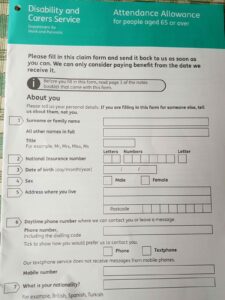Adult Social Care

It is important to understand that Health and Social Care are not the same thing. Healthcare is provided free by the NHS for a health or nursing need and Social Care is assessed by the Local Authority (otherwise known as the Council, Social Services, Adult Social Care) and means tested.
There are services that the Council must provide free of charge including the assessments, safeguarding services and some short- term support but usually the person requiring ongoing care will need a financial assessment and be required to make a contribution if they can afford to.
Only after a care needs assessment from your Local Authority, can a financial means test assess your income, savings and property to work out what will be disregarded and how much (if anything) you have to pay for your care and support. These assessments are FREE.
Care Needs assessment
The Care Act 2014 is the legal framework for Social Care in England. It is supported by the Care and Support Regulations and Statutory Guidance which came into force on 1st April 2015.
A care needs assessment (and an assessment of a Carers needs) are free of charge, regardless of who is paying for the care.
Once assessed with an eligible care need a financial assessment will determine any client and/or Local Authority contribution.
Request the FREE 'How does the Council assess care needs' information sheet
Financial Assessment
A Local Authority has the discretion to choose whether or not to charge following a care needs assessment but apart from some services which must be provided for free, ongoing Adult Social Care (unlike NHS services) is usually means tested. When a Local Authority charges for care and support services they must follow the Care and Support (Charging and Assessment of Resources) regulations and have regard to the Care and Support Statutory Guidance.
Savings/Capital
The following rules apply to financial assessments for both residential care and care at home;
- Residents with over £23,250 savings/capital will meet the full costs of their care and are considered able to pay for their own care in full.
- Residents with between £14,250 and £23,250 will make a contribution from their savings/capital as a tariff income of £1.00 for every £250 or part of, a contribution from income will also be assessed
- Residents with Savings/Capital below £14,250 will not make a contribution from capital, but a contribution from income will be assessed.
Remember it is an individual’s care need being assessed and so an individual’s ability to contribute towards the cost that will be financially assessed, any joint savings will be halved during a financial assessment (unless an unequal share is clear)
If you would like help to understand what Capital will be disregarded from a financial assessment please make an appointment for a Care Funding and Benefit Check
Care At Home
Because a person who receives care and support outside a care home will need to pay their daily living costs charging rules ensure they have enough money to meet these costs. For care at home, after charging a person must be left with the appropriate Minimum Income Guarantee (MIG).
Care in a Care/Nursing home
Following a financial assessment you may be required to contribute towards your care costs (client contribution). The majority of your income and half of an occupational pension (if you giving your spouse half) will be included in an assessment. You will retain a Personal Expenses Allowance (a small amount of pocket money). If the Local Authority agrees the cost of care against the value of a property (Deferred Payment Agreement), you may keep more of your income as there are usually property expenses.
If you would like help to understand how the Local Authority may pay towards your care, Please ask us to explain these rules to you.
Property Disregards
The value of the person’s main or only home must be disregarded where the person is receiving care in a setting that is not a care home or where the person no longer occupies the property but it is occupied in part or whole as their main or only home by a relative or member of the person’s family who is aged 60 or over. The mandatory disregard only applies where the property has been continuously occupied since before the person went into a care home and is not applicable in your circumstances.
12 Week Property Disregard
A local authority must therefore disregard the value of a person’s main or only home for 12 weeks in the following circumstances:
(a) when they first enter a care home as a permanent resident
(b) when a property disregard other than the 12-week property disregard unexpectedly ends because the qualifying relative has died or moved into a care home
26 Week Property Disregard
Capital received from the sale of a former home must be disregarded for at least 26 weeks in a financial assessment where the capital is to be used by the person to buy another home. This should apply from the date of completion of the sale. A local authority may choose to apply the disregard for longer where it considers this appropriate, for example where a person is taking legal steps to occupy premises as their home, but the legal processes take more than 26 weeks to complete.
Deferred Payment Agreements
A Deferred Payment Agreement (DPA) is an arrangement with the local authority that enables a person to defer or delay paying some or all of the cost of their care until a later date. It is a way to prevent people from having to sell their home in their lifetime to meet the cost of their care. A charge is paced upon the property, interest is charged and an administration fee may also apply.
Request our FREE Deferred Payment Agreement information sheet
Government plans to introduce a new £86,000 cap on the amount anyone in England will have to spend on their personal care over their lifetime have been scrapped by the new Government (Aug 2024). The cap had been delayed until Oct 2025 and would have applied irrespective of a person’s age or income and be implemented under the Care Act 2014. Only money spent on meeting a person’s personal care needs would have counted towards the cap. Spending on daily living costs (commonly referred to as “hotel costs” in a care home) not included. The cap would not apply retrospectively (ie costs accrued before will not count towards the cap). If you are not sure if/how these changes may affect how you pay for care and support please ask us for advice or a Care Funding and Benefit check. If you spend or give away an asset or do not claim an income or benefit entitlement available to you and the Local Authority and/or DWP decide that this was done with a deliberate intention to avoid paying for your care or access a benefit entitlement then they may treat you as still owning or having it and the financial assessment can include the amount as notional income/capital.
Social Care Reform
Deliberate Deprivation
If you would like some help to understand how a Local Authority assessment works, how they can help or charge for care please get in touch.
FAQ
Can I give my house or money away?
The simple answer is why are you intending to make the gift? If it is to avoid paying for care then that asset may still be included in a financial assessment and you may be treated as a self-funder. If you would like some help to understand the Local Authority Charging system please get in touch
Can I put my house in Trust to avoid paying for care?
If you are making a trust specifically to avoid paying for care then that asset may still be included in a financial assessment and you may be treated as a 'self-funder'. The Local Authority have 'Deprivation of Asset' rules which may or may not apply to a gift, depending on the type of asset, timing and intent of the gift. Please get in touch if you would like to understand how this may affect you.
Do I have to sell my house to pay for care?
Often a property will be disregarded from a financial assessment and it is important to get advice before selling your main or only asset. Please get in touch if you would like to understand your Care and Housing options.
What if I don’t agree with a NHS/Local Authority decision?
If you don't agree with a decision the first action would be to ask them to look at the decision again. Get as much evidence as possible (and relevant) and if you would like some advice before challenging a decision please get in touch



